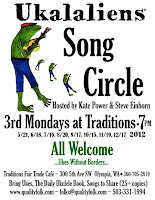I was talking with a good friend a few months ago, about the status of our country, politics, military actions overseas, and really just venting my frustrations. I see corruption in our government-- from top to bottom, and with both primary parties-- and get so frustrated that nothing seems to “change” for the better, that my attitude turns overly cynical. My friend, with whom I joke about being my big brother, concluded that since our leaders are not doing anything to improve the lives of people, it's up to us to do so. The manner in which we treat people around us is where it begins. The more people begin to consider those other than themselves, the healthier our society will become. Making music, sharing music, and teaching music is a tangible way to make the world around us a better place.
 |
| Find a local song circle & get involved |
 |
| Ukuleles make music too~ |
Making our world a better place is through music happens in many different ways. My friend has been a professional in the music business for years. One of the ways he makes our world a better place is by organizing and facilitating monthly song circles, and actively encouraging people to participate—no matter your skill level. During these sessions people are encouraged to share the art they’ve created with their guitar, or through their poetry. Not only is beautiful music brought into the world during these sessions, a healthy community is also being created and nurtured.
Music has been used as a form of therapy for thousands of years. The American Cancer Society has recognized the health benefits of music, and notes its historical use on their website, “Ancient Greek philosophers believed that music could heal both the body and the soul. Native Americans have used singing and chanting as part of their healing rituals for millennia.” In the treatment of cancer, music is used to “help reduce pain, anxiety, and nausea caused by chemotherapy... There is evidence that music therapy can reduce high blood pressure, rapid heartbeat, depression, and sleeplessness. There are no claims music therapy can cure cancer or other diseases, but medical experts do believe it can reduce some symptoms, aid healing, improve physical movement, and enrich a patient’s quality of life.”
Another example of music—specifically guitar music—to heal its people is found in an organization called Guitars for Vets. Their mission is simply stated on their website, “Enhancing the lives of ailing and injured veterans by providing them with guitars and music instruction.” This is an organization of volunteers working together with the Veterans Administration hospitals to supplement their treatment regimen. Most of the people who served in the military did so because they believed it to be an honorable act. It is important to remember that politicians make the decision to go to war, not the Soldiers, Sailors, or Airmen. Sadly, many of those who have gone to war return with serious physical, and/or emotional trauma. The method they use is to provide private guitar lessons, followed by “group sessions that provide a forum for the veterans to talk and play music with like-minded individuals, many of whom have had the same experiences, emotions and traumas. The music sessions provide a communal atmosphere.” The effectiveness of music therapy is clear when reading the testimonials, or watching the video interviews of those involved.
 “A better life through music” is the mantra of the Canadian Music Therapy Trust Fund, a non-profit organization that funds music therapy programs across Canada. Their mission is to, “promote, develop, and support music therapy services and research in order to restore, maintain, and improve the mental, physical, and emotional health of Canadians.” Their efforts are much broader than Guitars for Vets, using music to help children such as Caryanne, a blind infant at a Montreal palliative care unit, “…When she touches the instruments and there is a sound coming out of it, then she is an actor in this world instead of being just passive or receptive in her bed.” They support therapy for adults with developmental disabilities by giving them a sense of purpose, and an alternative means of communication.
“A better life through music” is the mantra of the Canadian Music Therapy Trust Fund, a non-profit organization that funds music therapy programs across Canada. Their mission is to, “promote, develop, and support music therapy services and research in order to restore, maintain, and improve the mental, physical, and emotional health of Canadians.” Their efforts are much broader than Guitars for Vets, using music to help children such as Caryanne, a blind infant at a Montreal palliative care unit, “…When she touches the instruments and there is a sound coming out of it, then she is an actor in this world instead of being just passive or receptive in her bed.” They support therapy for adults with developmental disabilities by giving them a sense of purpose, and an alternative means of communication.
If you’re a musician, be encouraged that you’re art can really help those who need healing. Take that a step further and help someone else get involved in music by teaching them what you know. If you would like to become a musician, don’t hesitate—do it! No matter your age, or perceived “lack of talent.” It is never too late to exercise your brain by accepting the challenge to learn something new such as the guitar. A good place to start is this blog—"Making Music" includes several resources that can help anyone along the guitar-playing path. We can make tangible changes through the power of music. Search out opportunities locally-- you might be surprised how much is actually happening right now. Make music, share music, teach music.
“That’s how powerful the music is… the music that I play-- what God gave to me-- is for no other reason than to help heal this planet, and the people in it.” ~Carlos Santana




No comments:
Post a Comment